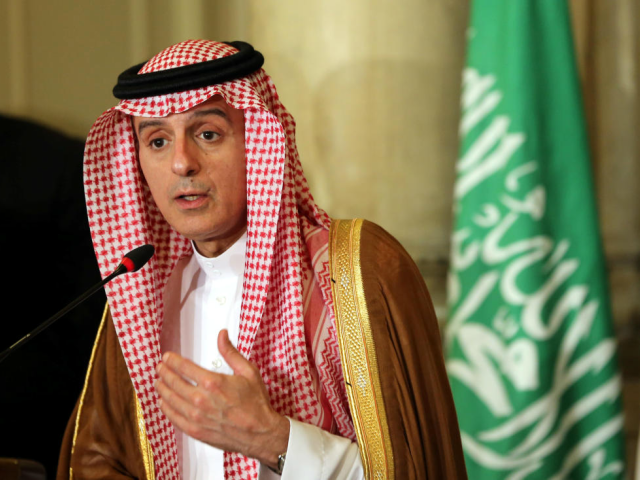Saudi Arabian Foreign Minister Adel al-Jubeir said in a CNBC interview on Thursday that Iran should face sanctions for its support of terrorism. He dismissed the nuclear deal struck with Iran by the Obama administration as too “weak” to restrain Tehran’s ambitions.
Jubeir began the interview by restating Saudi Arabia’s case that Iran provided the Houthi rebels in Yemen with the ballistic missile launched against Riyadh over the weekend. He described the missile as similar to one “smuggled into Yemen in parts,” assembled with help from Iran’s Islamic Revolutionary Guard Corps and Lebanese Hezbollah experts, and launched against the Saudi city of Yanbu in July.
“They’re the ones who provided the missiles in violation of U.N. Security Council Resolution 2216. We believe that it was Iranian experts and Hezbollah experts who taught and coordinated the attack against Saudi Arabia. So we believe that this could be considered an act of war,” he said. The resolution in question imposed an embargo on arms shipments to the Houthis in Yemen.
Jubeir called the situation in Lebanon “unfortunate,” and a result of “Hezbollah’s activities supported by Iran.”
“Hezbollah continues to maintain its militia even though it should hand over its weapons,” he said. “There can be no militia outside the scope of government institutions. Hezbollah has put roadblocks in front of every initiative that Prime Minister Hariri tried to implement. Hezbollah pretty much hijacked the Lebanese system and Hezbollah has been the instrument that Iran uses to dominate Lebanon.”
He said Hezbollah is also “the instrument that Iran uses to interfere in Syria with Hamas and with the Houthis,” as well as “smuggling weapons into Bahrain” and running criminal enterprises like drug dealing and money laundering.
“And so we see Hezbollah’s mischief all over the region,” he said.
Jubeir said Saudi Arabia, like the United States, wants to “help the Lebanese government be strong and be independent.” He advised world governments and institutions to unsparingly designate Hezbollah as a terrorist organization to reduce its malign influence, and suggested the same course should be taken with Iran.
“What I do know is that Iran is an outlaw state, that Iran is the number one state sponsor of terrorism, that Iran harbors terrorists, that Iran was in cahoots with Al-Qaeda and Osama bin Laden since the 1990s, that Al-Qaeda’s virtual board of directors fled to Iran in 2002 and have been living there ever since,” he said.
“They have directed terrorist operations including against Saudi Arabia from Iran while they were there. The order to blow up the three housing compounds in Riyadh came from Saif al-Adel, who’s their head of their operations, while he was in Iran in a phone call which we incidentally have on tape,” he continued.
Jubeir’s recommended solution involved “fixing” the Iran nuclear deal, which he described as “weak.” One of the fixes he had in mind is renewed sanctions against Iranian “support of terrorism” and “violating the ballistic missile resolutions of the United Nations.”
On Friday, Air Force Lt. General Jeffrey L. Harrigian told journalists gathered for an air show in Dubai that there are “Iranian markings” on missiles used by the Houthis. “To me, that connects the dots to Iran,” he said.
Harrigian specifically addressed the missile fired at Saudi Arabia over the weekend, saying, “What has been demonstrated and shown based on the findings of that missile is that it had Iranian markings on it. That in itself provides evidence of where it came from.”
In the course of reporting Harrigian’s comments, the Associated Press notes that hard-line Iranian cleric Mehdi Taeb, whose brother is intelligence chief of the IRGC, admitted in April that Iran has shipped missiles to the Houthis in the past. He claimed the shipments were stopped because the United States said negotiations for the nuclear deal would be ended if Iran continued sending missiles to Yemen.

COMMENTS
Please let us know if you're having issues with commenting.